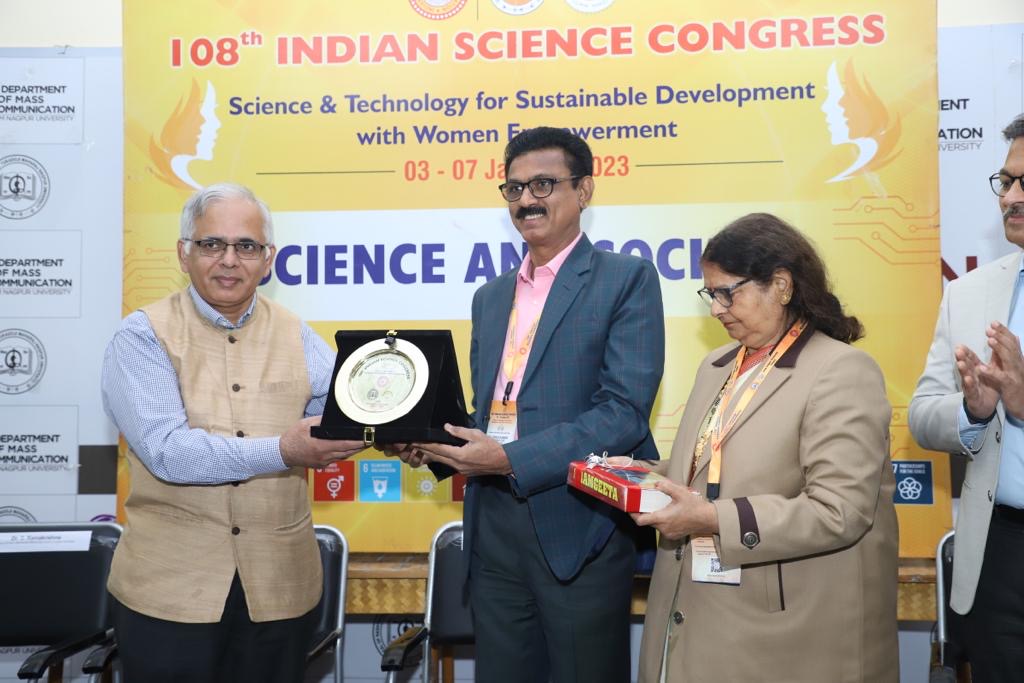The waste flowers from the temples of Nagpur will be recycled into Agarbattis and value added products like greeting cards. Nagpur Municipal Corporation and NEERI have identified the land near railway station for this project which would start functioning within a couple of months, said Shekhar Mande, former Director CSIR & former Secretary of DSIR while addressing ‘Science and Society’, a special event organized as part of 108th Indian Science Congress hosted RTM Nagpur University.
He cited his last meeting with NMC and NEERI officials at NEERI and added that Women’s self help groups would be incorporated in this project. Several other highly innovative and path-breaking initiatives are planned for the city, said Dr. Mandewho is an alumnus of this university.
Dr. Mande while addressing the inaugural function as the Guest of Honor, apprised the symposium the impact that science can make in economic growth of a nation with the example of Indian leather industry. In 1947, leather industry used to employ 25,000 people in India and the total export of this industry was worth one million US dollar. In results of CSIR’s policy, this industry currently employs over 50 lakh people and the total export value has gone to whooping 5 billion USD. Dr. Subhash R. Chaudhari, Vice-Chancellor, RTMNU felicitated Dr. Shekhar Mande with the memento of the event.
Mr. Shivkumar Rao, past President of Vidarbha Economic Development Council, and Director, R&Y Logistics, suggested that the university should join hands with industries and research institutions to develop aconsistent, vibrant and dynamic framework to implement ideas that come up in congregations such as the Indian Science Congress.
Dr. Lal Singh from NEERI delivered a presentation on bamboo plantation on fly Ash Dump Sites and Wastelands, the concept which has been actually implemented in Nagpur district. Distinguished speakers from eight different streams of science were invited in the technical session.
Dr. Vijay Laxmi Saxena, General President, ISCA, in her address suggested that science should be communicated to masses and specially the most vulnerable elements of the society. Speaking earlier, Dr. Subhash R. Chaudhari said that RTMNU in its centenary year is committed to increase the field work for the betterment of society and specifically the farmers. Dr. Prashant B. Maheshwari, Dean, Faculty of Science & Technology, RTMNU, and Dr. A.K.Saxena past General President, ISCA, also expressed their views during the symposium. Dr. Chandrahas Handa was the convenor of the symposium. The program was conducted by Dr. Mahesh Shuklaand a vote of thank was presented by Dr. Anuj Kumar Sharma.
Nobel Laureate Yonath lauds Indian scientists
Eminent crystallographer and Nobel Laureate, Dr. Ada Yonath, was all praise for Indian scientists and researchers. “It is great that you are focusing on very important subjects,” she said in her brief participation in the Science and Society event on the sidelines of the 108th Indian Science Congress. She was accompanied by her daughter Hagitha Yonath, a physician.
Indian physicist the late G N Ramachandran is one of the scientists most admired by her. His work led to the creation of the ‘Ramachandran plot’ for understanding peptide structure. Dr. Yonath said she was disappointed that he did not get the Nobel Prize. “He should have got it before me,” she said. She said, she chose crystallography because it contains the secrets of how molecules are formed and what is their structure.
She also expressed her happiness over the fact that a mega science meet like the Indian Science Congress is being held in a tier-2 city like Nagpur. “It is a trend to visit the big metropolises like Delhi and Mumbai. Here, in smaller cities like Nagpur, it is the real India,” she said. She has always been fascinated by India and had visited the country even before winning the Nobel Prize.
👉 Click here to read the latest Gujarat news on TheLiveAhmedabad.com





